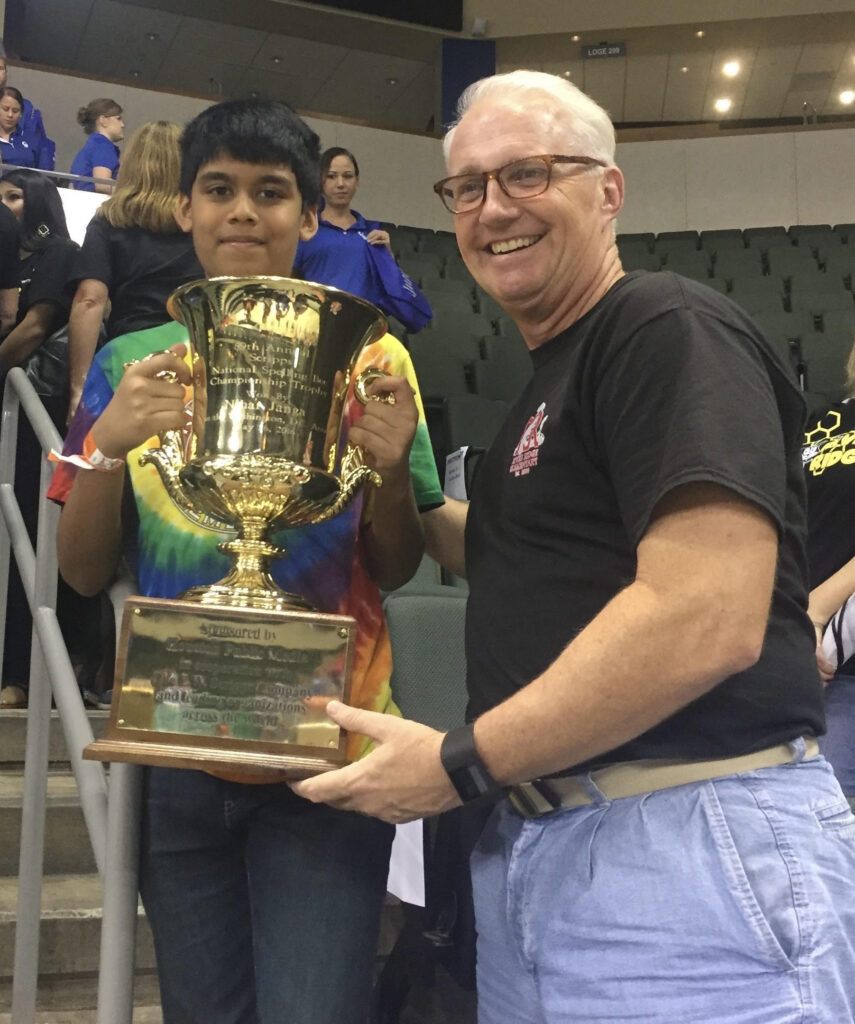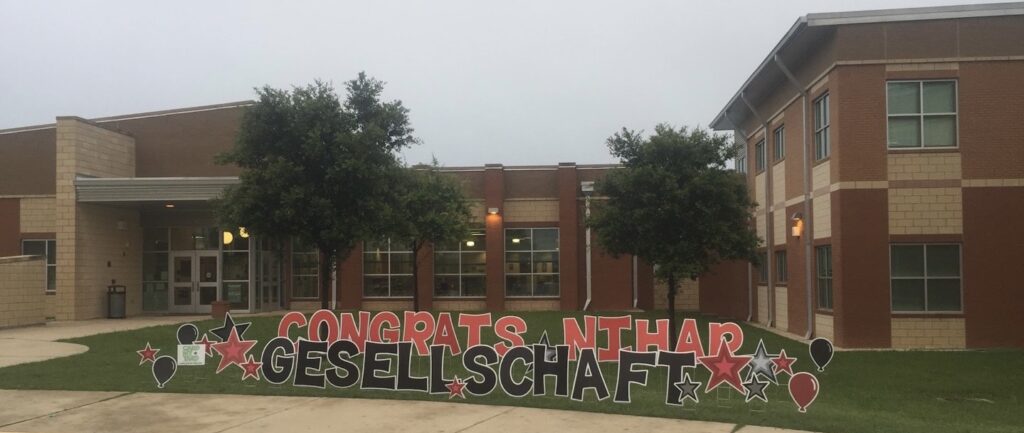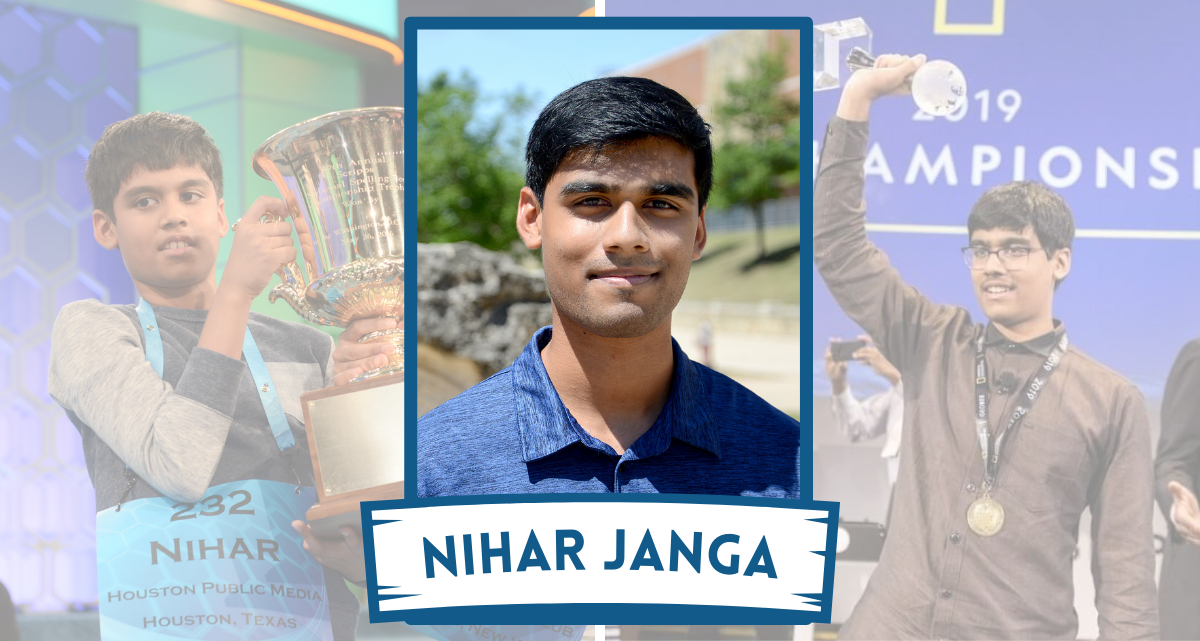With “Scripps National Spelling Bee winner” and “National Geographic GeoBee winner” already to his name, by walking across the stage at the H-E-B Center Saturday, Nihar Janga added one more title: Vandegrift High School graduate.
Beyond these accomplishments, the traits that have really come to define Nihar are his immense curiosity, strong desire to learn new things, and focus on how he can make a difference in the world.
His years studying and preparing for those two Bees – the Spelling Bee in 2016 while a 5th-grader at River Ridge Elementary and the GeoBee in 2019 while an 8th-grader at Canyon Ridge Middle School – helped establish a foundation for learning he carries with him to this day.
“Being able to have the determination and motivation in moments where you have to push through; being able to manage your time; being able to access that higher level of thinking – not just identifying things, but being able to connect concepts,” Nihar said, “all of those made high school pretty easy.
“The most important thing is not to learn something; instead, it’s to learn how to learn,” he added. “Once you learn how to learn, you can learn anything.”
“The most important thing is not to learn something; instead, it’s to learn how to learn.
– Nihar Janga
Once you learn how to learn, you can learn anything.”
Studying for those competitions was an individual experience for the most part – or at least within his immediate family circle. However, along the way, Nihar credited the supporting role his public school education played.
“The part that made a difference was the support I received,” Nihar said. “Not even necessarily preparing for the content – it’s having people recognize your efforts. It helps in times where you’re thinking about stopping or wondering if it’s even important or worth continuing on.”
From his time at River Ridge, Nihar gave special shout-outs to a handful of educators who provided that support: 4th-grade teacher Paul Smith; 5th-grade teachers Marlowe MacIntyre and Kathy Futch; and his principal at the time, Jim Rose, who now serves as the principal at Running Brushy Middle School. At Canyon Ridge, he remembers teachers Kiann Betancourt and Kelly Wadsworth supporting him and helping him keep up with current events.

“What an honor to be part of this remarkable young man’s education in Leander ISD,” Smith said. “I remember that he was a focused student, especially for a 9-year-old. He was very motivated, a self-starter and made me stay on my toes to keep him challenged in my classroom.”
“He has an inspiring work ethic, and he is extremely disciplined,” Rose said. “But, what I remember most about Nihar is that he is a great friend and a humble leader. He is caring and builds positive relationships with everyone he meets.”
In middle school, his principal at the time – Kimberly Waltmon, now LISD’s Executive Director of Special Programs & Services – remembers him as a top-notch student.
“He was curious, thoughtful and had high expectations for his educational experience,” Waltmon said. “He modeled being excited about learning and sought ways to gain knowledge based on his interests.”
In addition to learning how to learn, Nihar shared how competing on the national stage allowed him to see how each person is exploring the world with their own unique outlook.
“It’s satisfying to me because that means the world doesn’t have to be one thing,” Nihar said, “and it can be this fluid existence of many cultures and many things at once, rather than this one definitive perspective.”
Reflecting on what sticks out to him about the two Bees, he appreciated being given the opportunity to be recognized for exploring knowledge.
“Especially in an age where other things are prioritized,” Nihar said, “this was about personal passion rather than being results oriented – or related to money or power as the end goal.”
As the finals of the Scripps National Spelling Bee air Thursday night, you can count on Nihar being glued to the television, guessing along with the younger spellers. And when put on the spot to recall his winning word from 2016, Nihar reflexively answered “G-E-S-E-L-L-S-C-H-A-F-T”.

“I’ll never forget that word,” said Nihar, adding gesellschaft’s definition as being a relationship someone feels when in a company or society. For good measure, he also recited its opposite, gemeinschaft, describing a more organic and spontaneous relationship.
That deeper level of knowledge – going beyond the word’s spelling to its meaning and how to place it in context – certainly helped him in those pressure-packed moments of competition.
“I think I studied those words, but in the moment, it’s hard to pick certain things from your memory,” Nihar said. “Which is why you almost have to piece together every word you get unless you really, really know a word.”
Since winning, Nihar has worked with the North South Foundation, a nonprofit organization that helps kids practice for academic competitions and directs funds raised toward scholarships for kids in India. Nihar helped develop a virtual coaching program and an app for up-and-coming spellers to help pass along his knowledge and keep a focus on stressing the meaning and stories behind the words rather than rote memorization.
“Talking with spellers now, it doesn’t seem as fun as it should be compared to when I prepared for it,” Nihar said. “I wanted to bring my knowledge and ways of preparation into the app.”
Connecting to his desire to make a difference in the world, Nihar said in building the app, they are intentionally utilizing developers from rural areas in India to help support that economy and minimize the effects of urbanization.
Nihar is continually looking for new things to challenge him and ways he can make an impact. His 5th-grade career aspirations were to become a neuroscientist. When he starts at Stanford in the fall, he plans to study bioengineering.
“A big thing I’ve been interested in is regenerative tissue therapy,” he said. “I feel like Stanford would be a really good place to explore that, and bioengineering would let me do that.”
He noted this is not a complete deviation from his 5th-grade neuroscience focus, as he still plans to go to medical school. Also, one major area of tissue regeneration involves the brain.
“The biggest brain disorders now are Parkinson’s and Alzheimer’s,” Nihar said. “And they have to do with neurons degenerating. Being able to regenerate those would be big.”
“The biggest brain disorders now are Parkinson’s and Alzheimer’s. And they have to do with neurons degenerating. Being able to regenerate those would be big.”
– Nihar Janga
Before heading to the west coast to begin his undergraduate adventures, he’ll be heading south to make the most of a holdover prize from the GeoBee: a summer trip to the Galapagos Islands.


